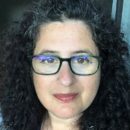We have much more to do and your continued support is needed now more than ever.
Green STEM: Real-World Learning With NYC Eco-Schools
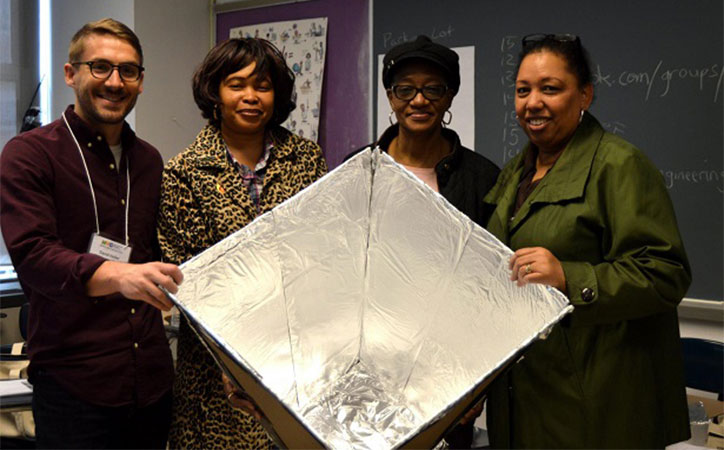
On April 26-28, the NYC Department of Education hosted its second annual Spring STEM Institute for 600 teachers at Stuyvesant High School. As part of the Institute, NYC Eco-Schools was invited to lead a Green STEM workshop, “Green STEM: A Model for Real-World Learning,” to engage teachers in using the environment and the outdoors as a context for teaching Science, Technology, Engineering, and Math (STEM) to students.
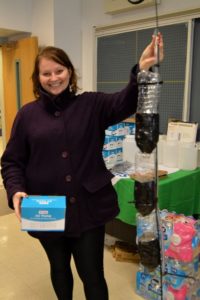
We reached out to four teachers from our Green STEM Advisory Board to help create content-rich workshops. Over the course of three days, a total of seven NYC Eco-Schools teachers facilitated an array of exciting, hands-on lessons for students in grades K-12 that focused on real world issues.
School Garden Design – This session, presented by Greenpoint Eco-Schools Sustainability Coach Tina Wong and PS 34 (Brooklyn) STEM teacher Jeanne Marshall, explained how to apply the design and engineering process to school garden design. Participants learned about incorporating scale drawing, urban planning and engineering concepts, and the importance of including pollinator-friendly native plants and fruit-bearing trees. They spent some time designing their own school gardens in groups, then shared their drawings with their peers.
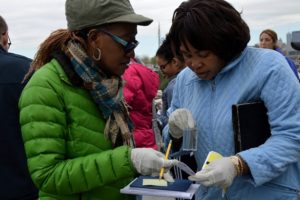
Water Quality – MS 51 (Brooklyn) science teacher Steven Sandman presented an activity to map local land and water bodies, presented an overview of Combined Sewer Overflows, highlighting local water bodies like the Gowanus Canal, and led an engaging trip to the waterfront to collect and test water samples taken from the Hudson River. Participants tested for temperature and turbidity and learned about fecal coliform levels in NYC waters.
Oil Spills – PS 41 (Manhattan) science teacher Vicki Sando presented an overview about oil spills, and guided participants through a hands-on lesson – used with 1st and 2nd graders – to design an oil spill containment and clean-up system using simple materials like vegetable oil (sprinkled with cocoa to make it look like oil), cotton balls, coffee filters, popsicle sticks, and pipe cleaners. They also learned about a novel system to clean up spills using magnets.
“Eco-Schools’ Green STEM workshop was by far one of the best professional learning sessions of my career! I can’t wait to turn my 5th graders into lead oil spill containment and extraction researchers,” said Wendy Poveda, a teacher at PS 132 in Manhattan.
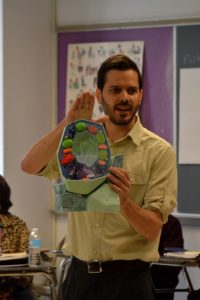
Plant Science and Hydroponics – Maspeth High School (Queens) biology teacher Aaron Bell inspired participants with his presentation about the vital role that plants play in our biosphere. First, participants performed a hands-on experiment that allowed them to observe plant stoma under microscopes. Next, they mashed up spinach leaves in mortars and pestles and added ethanol to extract chlorophyll. Participants were able to observe chlorophyll fluorescence using ultra-violet lights because in a dark setting, chlorophyll will fluoresce in the red part of an ultra-violet spectrum.
Williamsburg Preparatory High School teacher Juliet Crupi discussed hydroponics and sustainable agriculture and led a hands-on activity making Do-It-Yourself vertical hydroponic growing systems using recycled water bottles and small motors.
Solar Cookers – Led by Juliet Crupi, participants worked in teams to build solar cookers using cardboard, aluminum foil, and black tape. Particularly for families in developing countries who rely on wood, coal, or dung to cook, and also for folks interested in living “off the grid”, solar cooking is a free, simple, safe, and convenient way to cook food (and pasteurize drinking water) without having to use fuel.
I learned so much from all the hands on activities and the resources shared by the presenters. I loved collaborating with different teachers from all different grades, and I definitely will be bringing this information and activities into my classroom and putting my school on the Eco-Schools track.” – Jamil Jimenez, teacher at High School For Service and Learning (Brooklyn)
See more photos from the workshop by photographer Teri Brennan and join NYC Eco-Schools’ Facebook group page.
Learn MoreTo learn more about Eco-Schools USA’s Green STEM Initiative and NYC Eco-Schools’ Green STEM Advisory Board, download Eco-Schools’ Green STEM Guidebook.

